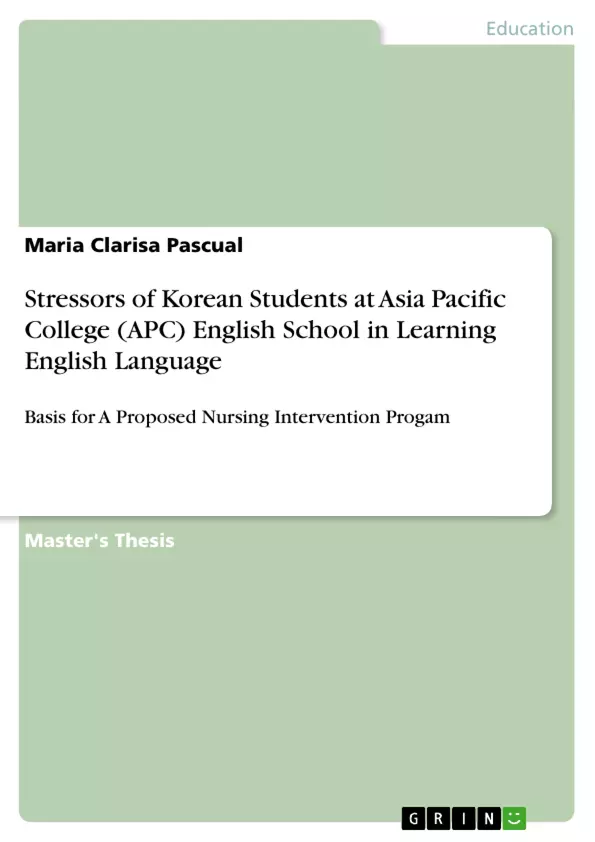The study is about the problems that are faced by students in learning a foreign language (English) in a foreign land (the Philippines). The study also tackles about the possible nursing intervention to aleviate or at least lessen the level of stress and anxiety of Korean adult learners.
Inhaltsverzeichnis (Table of Contents)
- Statement of the Problem
- Hypothesis
- Scope and Limitation
- Significance of the Study
- Definition of Terms
- Review of Related Literature
- Research Methodology
- Results and Discussion
- Summary, Conclusion and Recommendations
Zielsetzung und Themenschwerpunkte (Objectives and Key Themes)
This thesis aims to identify and explore the stressors experienced by Korean students while learning the English language at the Asia Pacific College (APC) English School. The study seeks to understand the specific challenges and difficulties faced by these students in their academic journey. This understanding serves as a foundation for developing a nursing intervention program to support and empower these students to cope with the stressors they encounter. Key themes investigated in this research include:- The impact of various stressors on Korean students' English language learning.
- The relationship between student demographics and their perceived stress levels.
- The identification of specific stressors related to teachers, peers, academics, and the learning environment.
- The development of a nursing intervention program to mitigate the negative effects of stressors.
- The potential for the intervention program to improve student outcomes and enhance their overall learning experience.
Zusammenfassung der Kapitel (Chapter Summaries)
- **Chapter 1: Introduction** This chapter introduces the research problem and provides a rationale for the study. It highlights the growing number of Korean students seeking English language education in the Philippines, emphasizing the need to understand the challenges they face. This chapter also outlines the study's objectives, research questions, hypothesis, and the significance of the findings.
- **Chapter 2: Review of Related Literature** This chapter presents a comprehensive review of existing literature related to the stressors experienced by foreign students learning English as a second language. It examines studies exploring the various factors that contribute to stress and its impact on learning. This chapter also examines existing research on the effectiveness of nursing interventions in supporting students and promoting positive outcomes.
- **Chapter 3: Research Methodology** This chapter details the methodology employed in the study. It outlines the research design, population and sample selection, data collection methods, and data analysis procedures. This chapter provides a clear and transparent account of how the study was conducted.
- **Chapter 4: Results and Discussion** This chapter presents the findings of the study, including the demographic characteristics of the participants, their perceptions of stressors, and the relationship between student characteristics and their perceived stress levels. It also discusses the implications of these findings and compares them to existing research.
Schlüsselwörter (Keywords)
This research focuses on the stressors faced by Korean students in English language learning at the Asia Pacific College (APC) English School. Key themes include: stress, Korean students, English language learning, nursing intervention, student demographics, academic stressors, social stressors, environmental stressors, and cultural adaptation. The study aims to contribute to the field of nursing practice by identifying effective strategies to mitigate stress and support the academic success of foreign students.Frequently Asked Questions
What is the main objective of the study at APC English School?
The study aims to identify and explore the stressors experienced by Korean students while learning English in the Philippines, specifically at Asia Pacific College.
Which types of stressors are investigated in this research?
The research categorizes stressors into those related to teachers, peers, academic requirements, and the overall learning environment.
What is the proposed solution to help these students?
The study explores the development of a nursing intervention program designed to mitigate the negative effects of stress and anxiety on adult learners.
How does the study analyze the relationship between student characteristics and stress?
It examines how various demographics, such as age or background, correlate with the perceived levels of academic and social stress.
Why is this research significant for the field of nursing?
It contributes to nursing practice by identifying effective strategies and interventions to support the mental health and academic success of foreign students in a new cultural environment.
- Quote paper
- Maria Clarisa Pascual (Author), 2011, Stressors of Korean Students at Asia Pacific College (APC) English School in Learning English Language, Munich, GRIN Verlag, https://www.grin.com/document/212007



